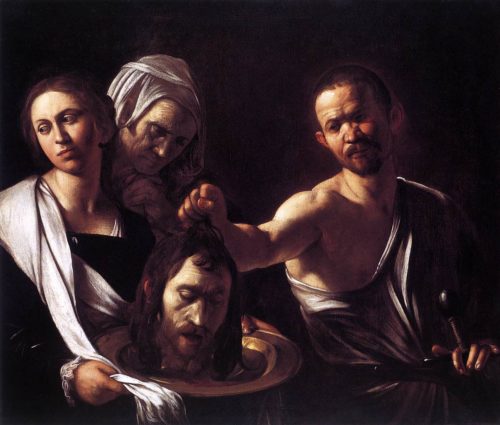 Every so often, when I reflect on daily readings, I don’t gain a lone idea or inspiration; rather, I have a few different thoughts that come through my head. This is what happened when I reflected on today’s readings, particularly the Gospel selection from Mark that recounts the death of John the Baptist.
Every so often, when I reflect on daily readings, I don’t gain a lone idea or inspiration; rather, I have a few different thoughts that come through my head. This is what happened when I reflected on today’s readings, particularly the Gospel selection from Mark that recounts the death of John the Baptist.
• Be careful what you promise. According to Mark’s recounting, it seems Herod didn’t particularly want to kill John . . . or, more correctly, his fear of John as a holy and righteous man overpowered his desire to kill John. But his pride at keeping a (really stupid) promise apparently overpowered his own sense of right and wrong, and he did as Herodias’ daughter requested.
I’ve seen grown adults do incredibly ill-considered things all in the name of keeping a promise or some sense of pride; I’ve certainly heard about people doing literally suicidal or life-altering criminal activities. I don’t particularly feel like diving into the question of whether or when it’s appropriate to break a promise, but I note that some of the most serious promises we make in the Church — the sacrament of marriage, the vows of priesthood, the seal of the confessional, and the like — all generally require extensive training and/or preparation, are often bolstered by the grace of the sacraments, are considered among the most serious decisions a human can make . . . and, yes, should not be considered “breakable.” Regardless, those promises should never be made off the cuff, like Herod does! And if you do realize that you’ve made an exceptionally stupid promise . . . well, you might want to check with your local priest, but “breaking a promise” versus “accessory to murder” is a fairly easy calculus for me.
• The Bible is full of parallelisms. I’ve likely encouraged reading the full Bible in the past, and one of the reasons I do so is because various sections inform each other. Reading straight through, you’ll find foreshadowing of the New Testament in the Old Testament, and fulfillment of the Old Testament in the time of Christ. You’ll also find ways that history repeats itself, usually due to human hubris or inability to listen to God.
And sometimes you’ll see connections where you’re not necessarily expecting them. The death of John the Baptist probably doesn’t spring readily to mind when we consider the life of Christ, but it’s amazing how much of Christ’s death is presaged by John’s: a righteous and holy man imprisoned by the state, a feckless ruler with the power over life and death who abdicates that power to others, a body claimed by disciples and laid in a tomb.
I don’t have much else to say about this fact, outside of noting that it seems like one more way God is connecting the dots for us all that the sacrifice of Christ and the sacrifice of those who believe in Christ can be very much one and the same.
• We may not be the center of our own stories. One thing I note about this telling of the Passion of Saint John the Baptist is how little he factors directly into it. He has one line earlier (“It is not lawful for you to have your brother’s wife.”), but we otherwise don’t hear from him again. Unlike the recounting of the death of Jesus, we don’t know what John’s last words are, nor do we have hardly any details about the specifics of how he was beheaded.
These specifics would almost certainly make for an interesting story: What does a righteous and holy man do or say just before he is about to be executed? How does that affect those who are called to carry out the sentence? But — for whatever reason — it’s not something that the Spirit deemed necessary for the Gospels.
In our own lives, coming to realize that the most important aspect of any given situation is not us — but someone or something else — can bring us closer to understanding who and how we should be turning our attention. I’ve written a bit about this before, but it’s a good reminder that we’re all part of the body of Christ, and serving Christ should be our primary purpose. In the same way that our hand or earlobe shouldn’t demand special treatment in fulfilling our body’s goals, neither should we necessarily be distraught if the “story” we’re part of is adding to a larger whole of goodness, rather than focusing on us and our needs.
These were all things that came to mind as I reflected on Scripture today, the Memorial of the Passion of Saint John the Baptist. If you had any thoughts of your own, please feel free to share; the Spirit is working with us all to bring everyone closer to God.
Today’s readings: 2 Thes 3:6-10,16-18; Ps 128:1-2,4-5; Mk 6:17-29
